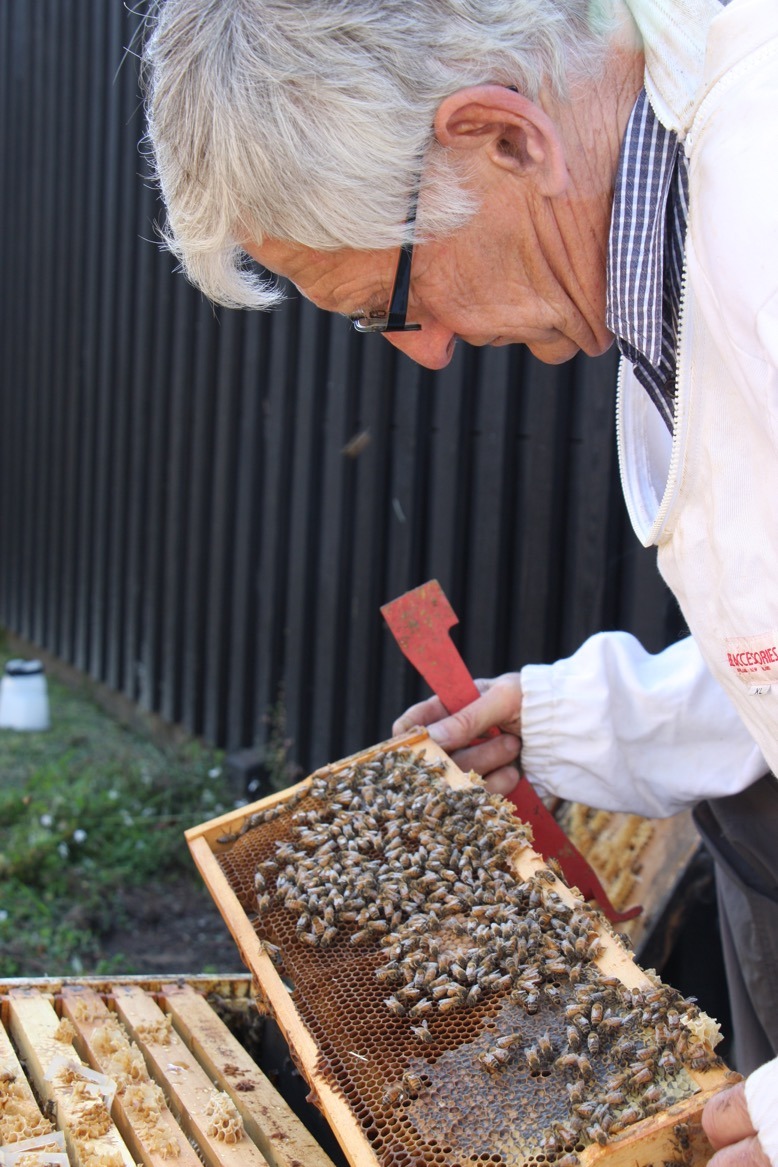A former Tauranga lawyer is showing his sweet side with a commitment to bees
By Good magazine

In the heart of Tauranga’s CBD, enclosed by businesses and the bustle of urban life, a lawyer sits deep in conversation with a client. But outside the office walls, surrounded by the soon-to-be flourishing pohutukawa trees, a man wears a suit of a different kind as he tends to four beehives.
Thanks to Alan Tate’s passion and appreciation for the humble honey bee, the former lawyer and founder of Harris Tate Lawyers is bringing a sense of the country lifestyle to the corporate world in the Bay of Plenty – and all the while doing his part of protect nature’s thriving eco-system.
“Bees are fascinating creatures,” explains Alan, who founded Harris Tate in 1995 with Ross Harris.
“A beehive isn’t just a cluster of individual bees; it is a colony where every bee has a function and those functions change over time – whether a worker, drone or the queen, the hive has a collective mind of its own.
“When you open a hive with this background knowledge you know what is going on and can identify what each individual bee is doing; what their role is and how it all operates. It is just an interesting thing to understand.”
According to Apiculture New Zealand, our nation’s bee population contributes approximately $5 billion to our economy annually and they support about one third of everything we eat. Plus, New Zealand’s Manuka honey is some of the highest-valued honey in the world.
The national body is nearing 700,000 hives (up from 300,000 15 years ago), with hive numbers increasing by nearly 70,000 between 2014 and 2015 alone.

The varroa mite and other endemic viruses and bacteria are currently the biggest threats to our bees’ survival. However, beekeepers have been successfully managing these for a number of years and research is ongoing to find new ways to treat varroa.
Apiculture New Zealand CEO Daniel Paul says, despite this, the numbers of beekeepers and hives – particularly in the hobbyist/non-commercial sector – have been increasing over the past couple of years. There are close to 7000 beekeepers nationwide.
It’s a trend Alan, 69, epitomises, having hung up his suit and tie four years ago. He’s now a ‘one-man band’ business supplying hives around the city and procuring honey from his own hives (which he shares with the clients).
But it’s the four hives at his former offices at Brown Street, kept in an enclosed courtyard among nature’s flora and fauna, that are dear to his heart due to their distinct location.
Each year, without fail, the towering pohutukawa trees enveloping the hives flower prolifically from mid-November to late December, adding a splash of vibrant red to the city at a time when few other flowers are in bloom.

And it’s a match made in heaven for the bees, according to Alan.
“It always seemed a waste to see them flower magnificently and all that wonderful nectar go to waste in what could be a honey that has a wonderful flavour.”
Today the 160,000 Harris Tate bees produce up to 40 to 50kg of honey per year, which is split into 250g jars – somewhat reflective of the busy bee mentality its legal counterparts showcase inside on a daily basis.
Man and Mother Nature’s winged creatures, working together. It’s a bond which has bolstered the firm’s long-standing commitment to the environment, headlined by the development of a new, environmentally sustainable building in 2007.
While completed before the Green Star Certification system was in place, it was Tauranga’s first privately owned building that would achieve five-star status under the certification criteria. Substituting natural light and air flow in place of florescent tubes and air conditioning are just some of the building’s innovative features.
Harris Tate director Grant Harris says they are proud of their uniqueness in helping reduce the firm’s impact on the environment, which includes Alan and his bees.
“The LLB associated with a law degree has more than one meaning for us since we properly branded Alan’s honey to be called L.L.Bee. It also ties in with the name of Alan’s bee operation, Al’s Bees.
“When clients can see him tending to the beehives, usually from the boardroom, it certainly turns heads and the first question staff get asked is, ‘What is the story behind the beehives?’.”

It is this eco-friendly, yet tasty, set up that Alan believes is a shining light on what is a “very bee friendly Tauranga city”, thanks to year-round sources of food. He implores everyone to think about the honey bee and its important role in our biodiversity and economy.
“There is a trend. You read about it, in New York and other places, for people to have beehives on top of commercial buldings in really built-up places, and those hives do really well.
“And so for me there is a real opportunity for people to have beehives on top of their buildings or on some spare land.
“They are a long-standing part of the environment and without them we would be a lot poorer for it. Just think, even as far as people in their gardens with fruit trees and tomato plants needing to be pollinated, they would struggle.”






